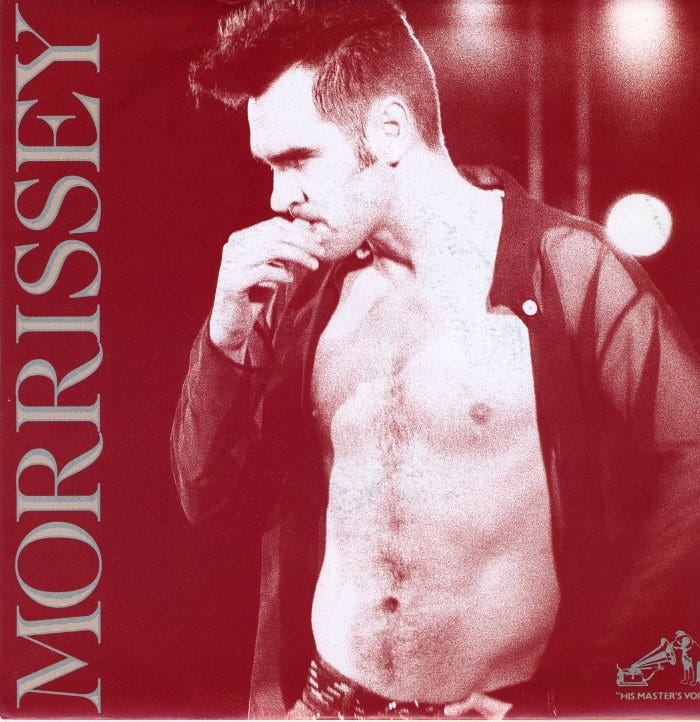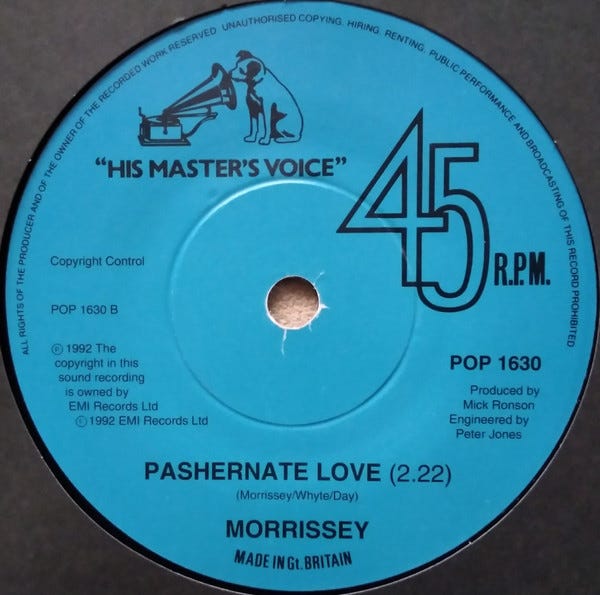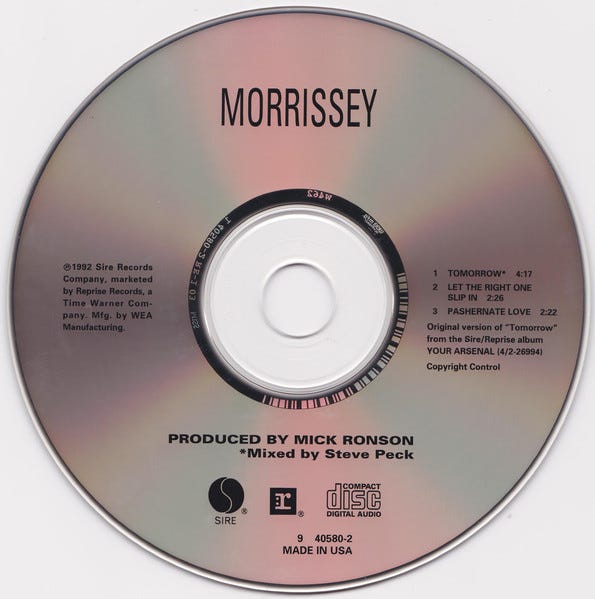'Pashernate Love'

Morrissey debuted "Pashernate Love" on October 8, 1991, at De Montfort Hall in Leicester, England, during the second UK leg of his Kill Uncle Tour. He introduced the song to the audience by stating, “This song is very new and... so please be gentle, it's called 'Pashernate Love.'”
One of the earliest songs co-written with guitarist Alain Whyte (with bassist Gary Day also sharing a co-writing credit), it was recorded in “North London in February 1992,” according to the single’s liner notes.
Produced by Mick Ronson, the track features the aforementioned Whyte (guitar) and Day (bass), alongside Boz Boorer (guitar) and Spencer Cobrin (drums).
'Pashernate Love' was released as the B-side for Morrissey’s 13th single, ‘You're The One For Me, Fatty’ (issued on July 6, 1992).
The song also appears on the B-side of the CD format of Morrissey’s next single, ‘Tomorrow’, which was released on September 8, 1992.

In an interview given to KCXX in August 1998, Morrissey said of ‘Pashernate Love’, "It's just a very simple pop song. You know, just another scratchy page from..."1
Starting with its deliberately misspelled title ("Pashernate" for "passionate"), the song nods to the English music hall2 tradition through its comedic use of language—mimicking a Cockney-inflected pronunciation in its title. In true music hall style, Morrissey’s lyrics play with romantic clichés, lust, and infatuation in a tongue-in-cheek manner (“Pashernate love could see make your Grandmother zoom roller skating back from the grave”), all delivered with his inimitable irony and an abundance of camp aesthetic.3
Not wasting a perfectly good opportunity, Morrissey’s utilizes a vocal delivery that is as theatrical as it is melodramatic, rendering the track a parody of a love song, though one that is very much worth analyzing.
While music hall’s influence is heard on the song, ‘Pashernate Love’ also has something of a vintage 1950s rockabilly quality. The Smiths had dabbled in rockabilly to a limited degree - most notably with ‘Rusholme Ruffians’ and a few other tracks—but it was in Morrissey’s solo œuvre that the style truly emerged for a time in the early 1990s. On ‘Pashernate Love’ one hears twangy guitars along with upbeat tempo, driving rhythm, and of course Morrissey’s stylized vocal phrasing, all of which echo 1950s rockers such as Eddie Cochrane and Gene Vincent in all of their glory.
Listen to the song here:
Pashernate love / In any form / Whether real or a dream
Pashernate love / Could make your system erupt / Into wild blisters and boils
The first lines of the song set a surreal tone, with love portrayed as being so potent as to possess the power to be physically hazardous ("blisters and boils"). Morrissey cleverly employs this exaggeration to vaguely hint that love's commonly celebrated passion may in fact prove disruptive (perhaps even dangerous, which the heart-broken will readily attest to).
Oh, as for me / It still doesn't understand me / It wouldn't lay one single finger on me
Despite its effects on others, Morrissey remains untouched - or cut off - from love’s sweet embrace. A hint of resignation lingers in his words: passionate love is something he can only glimpse from afar. This stark contrast between himself and others underscores a deeper alienation - a sense of permanent exile from something most people experience at some point in their lives.
Could make your Grandmother / Zoom roller skating back from the grave
Could make your old Daddy feel like / He may have a reason to live
These exaggerated, absurd images define love as a force that can defeat death and despair, a kind of tonic for the hopeless. Yet while humorous, these lines also reflect how foreign the notion of passionate love is to Morrissey - so far-fetched that he can only describe it in outlandish terms.
The song’s outro consists of Morrissey repeating “Where are you?” a staggering 12 times. While the tone of his voice does not drastically shift, the repetition adds a plaintive twist - a slow unraveling that reveals a quiet desperation. In these final moments his loneliness and yearning emerge - and perhaps a growing sense of futility as well.
Morrissey’s use of irony and absurdist humor, carried merrily along by the music’s upbeat tempo, masks the alienation and despondency that lurk beneath the surface. What appears at first listen to be a self-indulgent, semi-whimsical throwaway track is, in fact, a study in raw emotion and poignant introspection, revealing the singer’s bleak, loveless reality. That this genuine longing for the unobtainable is hewn into art is as astounding as it is courageous - an existential vulnerability revealed not with bombast, but with an almost offhand, aching sincerity.
Listen to a long version of ‘Pashernate Love’ (2:45 versus 2:22) taken from a record company cd-r of a scrapped reissue of Your Arsenal here:
We've worked our way up to track 11 which is "Passionate Love".
Morrissey: "Pashernate Love", yes. It's just a very simple pop song. You know, just another scratchy page from...
And where did this come from? Was this a b-side as well?
Morrissey: It was an English b-side, yes. And I think it possibly was a b-side here too. And it's not bad, really...
Is it kind of hard to keep track of what gets over here? Or do you get involved in the process of what's going to be over here and at home?
Morrissey: I do try to, yes, but sometimes it's hard. And it's easy to forget what's happened as the years roll by and you know one gets very old and things like that and things start falling off.
What is the definition of a b-side? Is it something where you like, 'Well, I'll write it for a b-side' or is it just something that's sitting on the shelf and you go 'Well, let's put this on for a b-side'"?
Morrissey: I always believed that b-sides could be just as powerful as A-sides really. So, they've never been inferior for me. Never, never...
https://web.archive.org/web/20030610003122/http://arcane.morrissey-solo.com/moz/interviews/1998/radio.htm
Music hall is a type of British theatrical entertainment that was most popular from the early Victorian era, beginning around 1850 through the First World War. It faded away after 1918 as the halls rebranded their entertainment as variety. Perceptions of a distinction in Britain between bold and scandalous music hall entertainment and subsequent, more respectable variety entertainment differ. Music hall involved a mixture of popular songs, comedy, speciality acts, and variety entertainment. The term is derived from a type of theater or venue in which such entertainment took place. In North America vaudeville was in some ways analogous to British music hall, featuring rousing songs and comic acts.
The so-called “camp” elements in Pashernate Love are abundant, consisting of exaggeration, theatrical irony, mock-romantic posturing, deliberate artifice, and a playful subversion of seriousness - all of which are foregrounded on the track.





